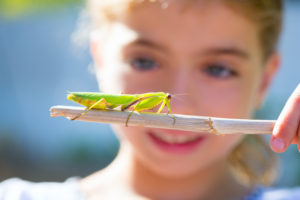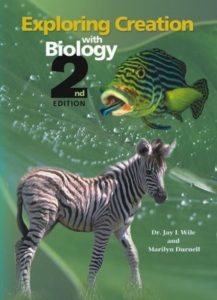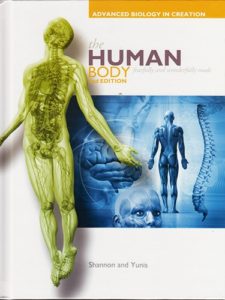 This page contains the experiments covered in the Apologia Biology curriculum course. This course (below) came about due to a huge number of requests I’ve had from parents that specifically use this curriculum and report their students are either “not getting it” or just so bored that they are resisting learning at all. Even if you don’t use this particular text, you can still work your way through this course and get a lot out of it using the experiments described below. (Note: If you are studying for the AP Biology exam, you will need content not included with this program, and you can find information on video available here.)
This page contains the experiments covered in the Apologia Biology curriculum course. This course (below) came about due to a huge number of requests I’ve had from parents that specifically use this curriculum and report their students are either “not getting it” or just so bored that they are resisting learning at all. Even if you don’t use this particular text, you can still work your way through this course and get a lot out of it using the experiments described below. (Note: If you are studying for the AP Biology exam, you will need content not included with this program, and you can find information on video available here.)
If you've got a student who's struggling to even like biology at all, I suggest starting this quick and easy Getting Started in Biology Guide to get them going before starting this course. This guidebook works well for even students who are already excited and ready to go with biology! Inside you'll learn how to make a laser microscope so you can see the critters swimming around in pond water, measure the size of a molecule using dish soap, extract DNA with rubbing alcohol, and more!
 The Course The experiments listed below are those found in the textbook, so all you have to do is click the link below and watch the step by step instructional videos for each experiment. There’s several different experiments to choose from! Most experiments have data logs and worksheets with them as well in addition to exercises to answer with each one.
The Course The experiments listed below are those found in the textbook, so all you have to do is click the link below and watch the step by step instructional videos for each experiment. There’s several different experiments to choose from! Most experiments have data logs and worksheets with them as well in addition to exercises to answer with each one.
This Biology course from Apologia is ideal for junior high and high school students who are looking to complete a first-year biology course. The course focuses on general biology. the scientific method, classifications, microscopy, biochemistry, cellular biology, genetics, dissection, and ecosystems. You can purchase the textbook here. We’ve added extra experiments in addition to the ones in the book, so look them over and see which experiments you’d like to do, and then see if you can figure out way to perform the experiment with the materials and equipment you already have. Have fun!
Apologia: Exploring Creation with Biology
If you love plants, animals, insects, and strange puzzling challenges, then this is the area of science for you. We’re about to see and do the kind of science that was not in your typical textbooks. Without biology, there would be no cure for diseases, and we wouldn’t understand which foods are the right ones to eat, why we have to brush our teeth and wash our hands, which water we can drink without getting sick, and athletes couldn’t figure out how to improve their performance. Biology helps us understand how life works so we can make the most effective use of that information, like how to clean up our environment or grow better crops without exhausting the soil.
In this course, you’ll get to discover how plants detect not only sunsets but also gravity, how to make a live cell laser microscope and observe organisms in their natural environment, how to extract DNA from food in your kitchen, how bacteria can be used to turn motors to generate energy, new types of biological energy conversion scientist have discovered, measure the size of a molecule using dish soap, and so much more! We’re going to cover quite areas of biology in this course, including zoology, biochemistry, molecular biology, ecology, botany, astrobiology, marine biology and more. We are going to discover how to be a real biologist in the field as well as learn the big concepts in biology and how they tie into both physics and chemistry.
If you're looking for Apologia Marine Biology, click here.
Work your way through the experiments listed below.
If you feel you’d like to go further with any of these experiments, feel free to visit Units 16-19 for more experiments and key concepts.
Module 1:
- Scientific Method
- Extracting DNA in your Kitchen
- Classifying Objects
- Classification Boxes
- Microscopes: Getting Started
- Anatomy of the Microscope
- How to Use a Microscope: Optics, Observing, and Drawing Techniques
- Preparing a Dry Mount Slide
- Preparing a Wet Mount Slide
- Slide Preparation: Staining
- Slide Preparation: Heat Fixes
Module 2:
- Bacteria Motor
- Magnetic Bacteria
- Laser Microscope (make this first, and then do the next experiment!)
- Bacteria in Humans and Dogs
- Should I brush my teeth?
- How Bacteria Grow
- Orange Bacteria
- Can bacteria get sick?
- Photobacteria
Module 3:
Module 4:
Module 5:
- Osmosis of Potatoes and Beans
- Celery Stalk Water Race
- Colored Flowers
- Chemistry overview of atoms, elements, molecules, matter, and states
- Photosynthesis
Module 6:
Module 7:
- Extracting DNA in your Kitchen (I've listed it here in case you skipped it before... be sure do this experiment now!)
- Mitosis
Module 8:
Module 10:
Module 11:
Module 12:
Module 13:
Module 14:
Module 15:
- What color light do plants like best?
- Stomata
- Tomatoes and Bananas
- Einstein's Garden
- Carnivorous Greenhouse
- Broccoli Science
- Turning Compost into Gold
- Creating a Plant
Module 16:
- Lizard Strike
- Snakes
- Bird Migration
- Penguins
- Rubber Eggs
- Feather Hunt
- Non-Gross Chicken Dissection
- Owl Pellet Dissection
- Cow Eye Dissection
 When you have completed this course (above) and ready to move onto the next course Apologia Advanced Biology, then you'll want to explore our entire section on Human Anatomy & Biology. Some of the experiments you’ll be doing in the course on anatomy include: a working lung model so you can see how pressure differences affect the lungs and diaphragm; a robotic hand model with real tendons; working eye model which you can adapt for near and far sighted conditions; how to do chemical fingerprinting… and so much more!
When you have completed this course (above) and ready to move onto the next course Apologia Advanced Biology, then you'll want to explore our entire section on Human Anatomy & Biology. Some of the experiments you’ll be doing in the course on anatomy include: a working lung model so you can see how pressure differences affect the lungs and diaphragm; a robotic hand model with real tendons; working eye model which you can adapt for near and far sighted conditions; how to do chemical fingerprinting… and so much more!
We will go over integumentary, skeletal, and muscular systems by beginning with a general overview of the body. We’ll also learn about what should we eat, what happens to food once we swallow it, and how your digestive system works, and why the standard American diet of fries, shakes, and sodas wreaks havoc on our digestive system. Another system we’ll cover is the respiratory system, which is responsible for providing your organs with the oxygen it needs and removing the carbon dioxide it doesn’t. Speaking of things your body doesn’t need, our next topic will be the excretory system, the one responsible for getting rid of all waste from the body. We’ll talk about how your body allows you to do all the things you do. In order to do those things, your body must stay healthy, and keeping you healthy is the job of the immune system.
